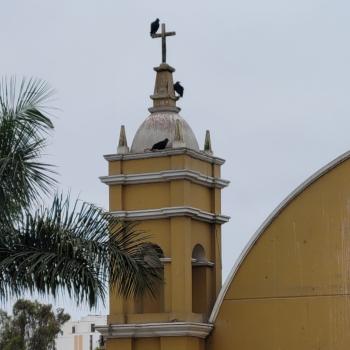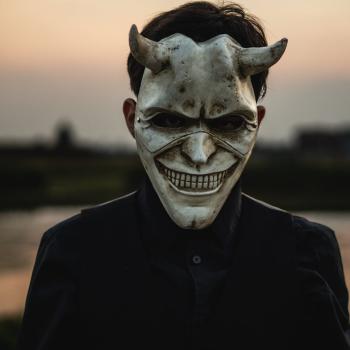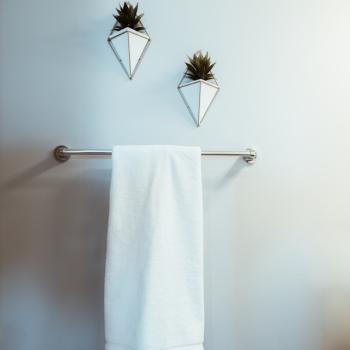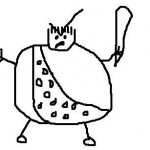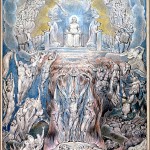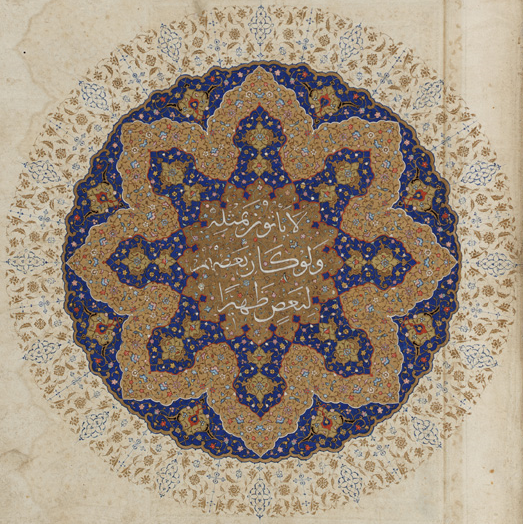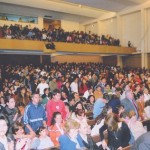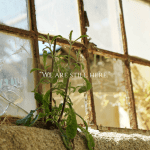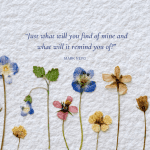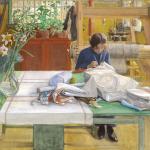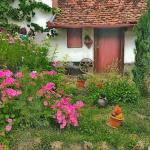I liked being homeschooled. To this day, I have no problem with it. Nonetheless, I will scrutinize my experience a little bit and discuss how I think things could have gone better. Hence splitting up the topic into good, bad and ugly, like I did with homemaking. Let me state up front, however, that I am not anti-homeschooling. I would consider homeschooling my own child up to a point (8th grade). I believe homeschooling actually did shelter me productively from things that could have made my childhood exponentially worse, as you’ll see below. Without further ado: “the good” in homeschooling.
Homeschooling gave me time to foster my own interests. I usually had all my school work done by noon, so I could spend my afternoons lost in reading and creative writing. My mother enabled this by planning my schedule a week or month at a time. I would check off the boxes for completed work each morning, and she’d review my performance at the end of the week. If I had something exciting planned, I could double up on my work and take a day off – in fact, I did this frequently. Since lessons like math and science usually involved reading a number of chapters and then completing work sheets and problem sets, I could even shorten my school year by doing one extra lesson a day. This I also did frequently. It was nice to get done with the academic year in March!
Although we started out homeschooling with odious materials like Bob Jones, A Beka, Weaver and LIFEPAC curricula, we eventually settled on Sonlight. This was a great choice. I was bored out of my mind with the repetitive, preachy worksheets of the first four. By the end of one lesson I felt like my eyes were about to melt and pour out of their sockets. Sonlight, a literature-based curriculum, allowed me to channel my love of reading into useful avenues. I learned about history by reading biographies of people like Ben Franklin. I become obsessed with Mark Twain. I read all the American Girl books and the Newberry bestsellers. Many of these books stand out in my mind: A Bridge to Terabithia made me cry. Walk Two Moons left me puzzled and sad. Julie of the Wolves delighted me. Pollyanna made me laugh. Anne of Green Gables and Caddie Woodlawn were my soulmates, and I bonded with Jo of Little Women. I struggled through The Yearling with fierce determination – that is a long book. Where the Red Fern Grows might have actually emotionally scarred me for life. I read Jules Verne and Charles Dickens, 1984 and The Invisible Man. I persisted, annoyed, through The Grapes of Wrath and The Lord of the Flies. I tossed Elsie Dinsmore aside in disgust and became a devotee of the Mandie books. In other words, nobody censored what I read: some of it was trite, religious crap. Some of it was piercing historical insight. Some set my mind reeling and inspired the stories I wrote for myself. Stories of courage and escape gave me the fuel I needed to push myself out of fundamentalism and to recognize that push as a struggle for my own independence.
In high school, I read Lies My Teacher Told Me for my history credit. I remember this book better than any of the early American history I’d read that fetishized the Puritans and the religion of the founding fathers. The book stripped away any illusions I had been taught, and better still, taught me the dynamism of history and its interpretations. Given that I’m now in training to be a historian, I’d say the book was pretty influential!
Even my Creationist science education was ultimately pretty positive for me. I used the Apologia textbooks by Jay L. Wile. What I remember about those books was the boundless joy in exploration that I found between the pages. Every module ended with a statement like, “Look how marvelous the world is! It’s so intricate and beautiful! The Creator shows his love through the glories of the natural world, and we should care about the earth the way God does.” That’s really not a bad moral to drive home. In the end, the Creationism rolled right off my back. I literally don’t remember any of the Creationist details. All I remember is that the Apologia textbooks made me love science and get excited about learning biology. That’s a pretty darn good outcome, I think.
By now you’re probably sensing a theme. I was an introverted bookworm with constant flights of imagination. I thrived on homeschooling because I worked best with lots of space and time to myself to think things through. I didn’t need encouragement to study; it came naturally. I was the kind of kid who could have been easily stifled by too much attention, too much forced socialization, and too much pressure to perform in front of a crowd. I don’t mind performance now (heck, I’m a teacher and have been a lecturer), but I needed to grow into it.
One final aspect of homeschooling that I still consider a positive was the way that it insulated me from peer criticism. The Christian homeschooling movement is a very insular one, and many people have pointed out the problems inherent to its isolation. Indeed, I don’t think isolation by itself is a great thing. The fact that it was helpful for me was entirely accidental.
I benefited from social isolation because my church had engineered me to be an outcast. I wore ugly, baggy clothes to be “modest.” I didn’t understand much slang and I didn’t get any movie, TV or music references. I didn’t know how to dance. I was afraid to touch other people. I jumped at curse words and thought small talk was stupid. My church wouldn’t allow me to cut my hair or wear makeup or pants. On top of that, poverty meant I had crooked teeth and horrible acne. In other words, I was a complete and utter loser. When I look back at pictures of myself at 13, I hardly recognize that kid.
In public school, I would have been exposed to a more diverse social group. I would also have experienced a new level of ostracism. I very badly wanted to be normal. But how normal can you be when you look like an orphaned Anne Shirley and can’t do anything fun? My high school experience would have been an endless series of disappointments: no beach parties, no first dates, no prom, no trendy clothes, no social status whatsoever. My self-esteem was already in pretty bad shape; if I’d been bullied on top of that, I might not have survived my teen years.
I’m glad that I was able to adjust to a normal peer group more slowly and on my own terms. At community college, I still had to dress funny but was figuring out how to make it look like I was just a formal dresser and not a weird religious kid. The fact that nobody looks alike in a community college classroom also helped me out. I took night classes, so I’d usually stand out as the youngest one rather than the weird one. By the time I got to my four-year school, I was listening to some normal music and was taking charge of my skirt wearing. I had taken up trimming my hair and wearing funky boots, so I looked “artsy”. I had also figured out how to conceal acne, which made me feel somewhat attractive for the first time. I could ease in, and people read me as “geeky” rather than oppressed. I could talk Lord of the Rings and video games with the best of the freshmen, and I was surprised to find that being a virgin at 20 was totally normal.
Homeschooling is not for everyone. If I hadn’t been raised in Christian patriarchy, I would have probably loved high school. But the solution to my social awkwardness would emphatically not have been sending me to public school: I’d have been eaten alive. Homeschooling protected me long enough for me to find myself before entering the world of my peers, and for that I am very, very grateful.
An additional word of caution: my experience as a homeschooled kid was largely positive because my mother was hands-off about policing what I read and whom I talked to. I had full internet access from the time I was 11. I had friends online who became my penpals. My mother didn’t vet them for their faith. Homeschooling gave me tons of freedom, but I was the exception. My homeschooled friends were regimented and made to follow dull workbooks. They were not allowed unsupervised internet time and their parents vetted all of their books before they read them. Classics like The Grapes of Wrath (yeah, I know, I hated it, but it’s worth suffering through) were off-limits. TV was outlawed and music was censored. My homeschooling experience was practically secular and liberal compared to theirs. I’m pretty sure that’s why I still consider it a success.
So, am I for homeschooling?
Yeah, in certain circumstances. I would consider doing it for the elementary years (or some of them, anyway) if I had a gifted, misunderstood child, a shy child who needed more time, a child who had to move and change schools all the time (like some military friends I had), or just a kid who wasn’t thriving in a very regimented school atmosphere. That said, I would absolutely send my kids to public high school. The only reason I don’t feel like I totally missed out was because my church had already conspired to put me on the bottom of the social ladder. If I had been a “normal” kid, high school would have been a good thing.






